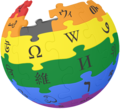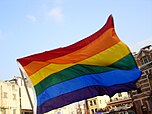
Back بوابة:مجتمع الميم Arabic Portal:LGBT Azerbaijani Партал:ЛГБТ Byelorussian Партал:ЛГБТ BE-X-OLD প্রবেশদ্বার:এলজিবিটি Bengali/Bangla Porched:Revelezh (LGBT) Breton دەروازە:کۆمەڵگەی پەلکەزێڕینە CKB Portal:Homo- und Bisexualität German Portal:LGBT DIQ Πύλη:ΛΟΑΤ Greek
| Main page | WikiProjects & Things you can do |

|
The LGBTQ+ Portal |

|

|

|
Introduction LGBTQ (also commonly seen as LGBT, LGBT+, LGBTQ+, and LGBTQIA+) is an initialism of lesbian, gay, bisexual, transgender and queer or questioning. It is an umbrella term, broadly referring to all sexualities, romantic orientations, and gender identities which are not heterosexual or cisgender. In the 1990s, gay, lesbian, and bisexual activists adopted the term LGB, supplanting narrower terms such as "gay or lesbian". Terminology eventually shifted to LGBT, as transgender people became more accepted within the movement. Around that time, some activists began to reclaim the term queer, seeing it as a more radical and inclusive umbrella term, though others reject it, due to its history as a pejorative. In recognition of this, the 2010s saw the adoption of LGBTQ, and other more inclusive variants. Some versions of the term, such as LGBT+ and LGBTQ+ add a plus sign, to represent additional identities not captured within the acronym. Many further variants exist which add additional identities, such as LGBTQIA+ (for intersex, asexual, aromantic, and agender) and 2SLGBTQ+ (for two-spirit), or which order the letters differently, as in GLBT and GLBTQ. The collective of all LGBTQ people is often called the LGBTQ community. These labels are not universally agreed upon by everyone that they are intended to include. For example, some intersex people prefer to be included in this grouping, while others do not. Various alternative umbrella terms exist across various cultures, including queer, same gender loving (SGL), Gender, Sexual and Romantic Minorities (GSRM). (Full article...) Selected article -Homosexuality has been documented in China since ancient times. According to one study by Bret Hinsch, for some time after the fall of the Han dynasty, homosexuality was widely accepted in China but this has been disputed. Several early Chinese emperors are speculated to have had homosexual relationships accompanied by heterosexual ones. There exists a dispute among sinologists as to when negative views of homosexual relationships became prevalent among the general Chinese population, with some scholars arguing that it was common by the time of the Ming dynasty, established in the 14th century, following homophobia entrenched in the Mongol empire and the Yuan dynasty, and others arguing that anti-gay attitudes became entrenched during the Westernization efforts of the late Qing dynasty and the early Republic of China in the 19th and 20th centuries. For most of the 20th century homosexuality in China had been legal, except for a period between 1979 and 1997 where male anal sex was punishable as "hooliganism". (Full article...) Selected biography -Alan Mathison Turing OBE FRS (/ˈtjʊərɪŋ/; 23 June 1912 – 7 June 1954) was an English mathematician, computer scientist, logician, cryptanalyst, philosopher and theoretical biologist. He was highly influential in the development of theoretical computer science, providing a formalisation of the concepts of algorithm and computation with the Turing machine, which can be considered a model of a general-purpose computer. Turing is widely considered to be the father of theoretical computer science. Born in London, Turing was raised in southern England. He graduated from King's College, Cambridge, and in 1938, earned a doctorate degree from Princeton University. During World War II, Turing worked for the Government Code and Cypher School at Bletchley Park, Britain's codebreaking centre that produced Ultra intelligence. He led Hut 8, the section responsible for German naval cryptanalysis. Turing devised techniques for speeding the breaking of German ciphers, including improvements to the pre-war Polish bomba method, an electromechanical machine that could find settings for the Enigma machine. He played a crucial role in cracking intercepted messages that enabled the Allies to defeat the Axis powers in many crucial engagements, including the Battle of the Atlantic. (Full article...) Selected quote -
Current events
Selected image - 14 May 1928 issue of German lesbian periodical Die Freundin ("Girlfriend")
Did you know… -
This month's birthdays
Selected listsRelated portalsFeatured contentThe following articles and lists have been identified as some of the best produced by the Wikipedia community:
TopicsCategoriesAssociated WikimediaThe following Wikimedia Foundation sister projects provide more on this subject:
Discover Wikipedia using portals |























